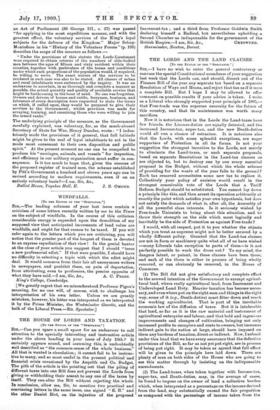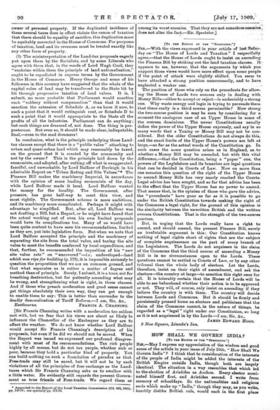THE LORDS AND THE LAND CLAUSES.
[To THE ELIT011 OF THE " SPECTATOR."1 SIR,—I have no wish to enter the general controversy or canvass the special Constitutional soundness of your suggestion last week that the .Lords can, and should, dissect out of the Finance Bill of the year any separate tax based on a separate Resolution of Ways and Means, and reject that tax AS if it were a complete Bill. But I hope I may be allowed to offer comment on possible results if your advice, is taken. I write as a Liberal who strongly supported your principle of 1905,— that Free-trade was the supreme necessity for the future of this country, and that its maintenance was worth many sacrifices.
Now it is notorious that in the Lords the Land-taxes have few friends, the License-duties are equally detested, and the increased Income-tax, super-tax, and the new Death-duties would all run a chance of ostracism. It is notorious also that the Lords, with some splendid exceptions, are eager supporters of Protection in , all its forms. Is not your suggestion the strongest incentive to the Lords, not merely to eliminate the Land-taxes, or such separate proposals, based on separate Resolutions in the Land-tax clauses as are objected to, but to destroy one by one every essential proposal in the Budget, without which the whole scheme of providing for the wants of the year falls to the ground ? Each tax removed necessitates some new tax to replace it. Collectively your policy of excision would result in the strongest conceivable vote of the Lords that a Tariff Reform Budget should be substituted.. You cannot lay down a. principle like this, and then arrest its operation arbitrarily at exactly the point which satisfies your own hypothesis, but does not satisfy the.demands of what is, after all, the. Assembly pf all the powerful class interests. Is it seriously wished. , by Free-trade Unionists to bring about this situation, and to throw their strength on the side which must logically and inevitably be the side of Protection as against Free-trade?
I would, with all respect, put it to you whether the objects which you treat as supreme might; not be better secured by a wholly different policy. Granted that the Land-tax clauses are-not in form or machinery quite what all of us have wished —many Liberals take exception to parts of them—is it. not perfectly possible to work the dross out ? To my mind, the dangers latent, or patent, in these clauses have, been three, and each of the three is either in .process of being wholly removed, or can obviously be removed, in the House of Commons.
(1) The Bill did not give satisfactory and complete effect to the avowed intention of the Government to exempt agricul- tural land, where really agricultural laud, from Incrementand Undeveloped Land Duty. Heavier taxation has become neces- sary, and even where put on the right men and things in the right way, some of it (e.g., Death-duties) must filter down and reach the working agriculturist. That is part of the inevitable economic law of the diffusion of taxes. But it is intolerable that land, so far as it is the raw material and instrument of agricultural enterprise and labour, and that hold and ingenious improvements and changes of cultivation, bringing not only increased profits to occupiers and rents to owners, but immense indirect gain to the nation at large, should have imposed on them any burdens of taxation, direct or indirect. Now, I submit under this head that we have every assurance that the defective provisions of the Bill, so far as not yet put right, are in process of being put right. It may be taken as agreed that full effect will be given to the principle here laid down: There are plenty of men on both sides of the House who are going to see this matter through by insisting on the indispensable amendments.
(2) The Land-taxes, when taken together with Income-tax, super-tax, and Death-duties, may, in the average of cases, be found to impose on the owner of land a collective burden which, when interpreted as a percentage on the income derived from the land, may substantially exceed the fair propoition as compared with the percentage of income taken from the
owner of personal property. If the duplicated incidence of these several taxes does in effect violate the canon of taxation that there should be equality of sacrifice, this duplication must be equitably corrected in the House of Commons. For purposes of taxation, land and its revenues must be treated exactly like any other form of property.
(3) The misinterpretation of the Land-tax proposals eagerly put upon them by the Socialists, and by some Liberals who agree with them that, in the words of Lord Hugh Cecil, they "enshrine within them the principle of land nationalisation," ought to be repudiated in express terms by the Government in the House of Commons. Henry George and some of his followers in this country have suggested that the whole of the capital value of land may be transferred to the State bit by bit through progressive taxation of land values. It is, I submit, no more probable that Parliament would sanction such "robbery without compensation" than that it would sanction the extension of Schedule A, as we have it now, to such a point that it would extinguish rent, or Schedule D to such a point that it would appropriate to the State all the profits of all the industries. Parliament can do anything ; but such things are dreamed of, not done. The thing is pre- posterous. But even so, it should be made clear, indisputable, final,—even to the mad dreamers !
In conclusion, what is the principle underlying these Land- tax clauses except that there is a "public value" attaching to urban and quasi-urban land which may reasonably be taxed, on the ground that it is created by the community and not by the owner ? This is the principle laid down by the economists, and adopted, after cutting off what is exaggerated, fanciful, and unworkable, by Lord Balfour of Burleig,h in his admirable Report on "Urban Rating and Site Values."* The Finance Bill makes the machinery Imperial, in accordance with the opinion of some leading economists of the day, while Lord Balfour made it local. Lord Balfour wanted the money for the locality. The Government, after pressure, has gone half-way to meet this view, and most rightly. The Government scheme is more ambitious, and its machinery more complicated. Perhaps it Might with advantage be simplified. But, after all, Lord Balfour was not drafting a Bill, but a Report, or be might have found that the actual working out of even his own limited proposals would hate its complications too. Many of us would have been quite content to have seen his recommendations, limited as they are, put into legislative form. But when we note that Lord Balfour accepted the principle and the machinery of separating the site from the total value, and taxing the site value to meet the benefits conferred by local expenditure, and that, further, he recommended the imposition of his "new site value rate" on "uncovered "—i.e., undeveloped—land which was ripe for building (p.173), it is impossible seriously to question the proposition that we are on common ground, and that what separates us is rather a matter of degree and method than of principle. Surely, I submit, it is a time, not for breathing destruction, but for patiently amending what may be wrong, and strengthening what is right, in these clauses. And if those ivho preach moderation and good sense cannot get things absolutely their own way, they can get enough to enable them to say: This is better than surrender to the deadly demoralisation of Tariff Reform.—I am, Sir, ac.,
[Sir Francis Channing writes with a moderation too Seldom met with, but we fear that his views are about as likely to influence the Chancellor of the Exchequer as they are to affect the weather. We do not know whether Lord Balfour would accept Sir Francis Channing's description of his proposals, but even if he did we should not be moved. When the Report was issued we expressed our profound disagree- ment with Most of its recommendations. Tax rich people highly by all means, but do not tax people, whether rich or poor, because they hold a particular kind of property. You can build nothing on Such a foundation of paradox as that. Free-trade may still be saved, but it wilt not be by such violations of all the principles of free exchange as the Land- taxes which Sir Francis Cha.nning asks us to swallow with a little water. He evidently still regards the present Govern- ment as true friends of Free-trade. We regard them as
• Appended to the Report of the Local Taxation commission (C.d. 638, 1901), pp. 149-76; see specially pp. 175-76. among its worst enemies. That they are not conscious enemies, does not alter the fact.—En. Spectator.]









































 Previous page
Previous page